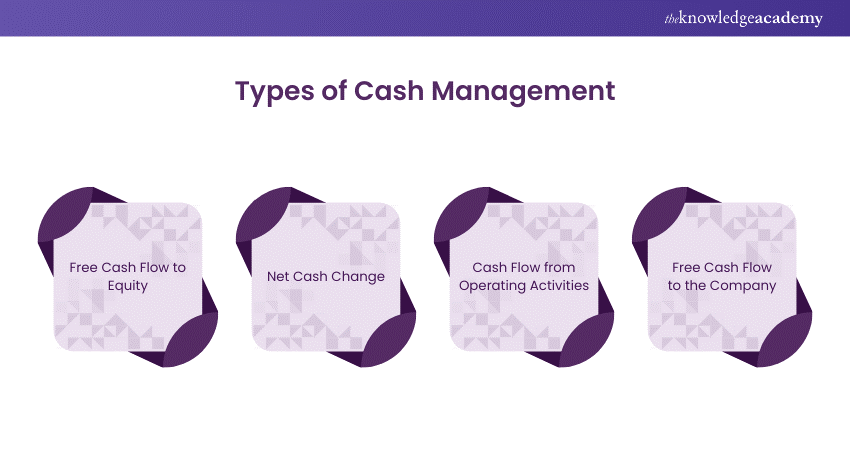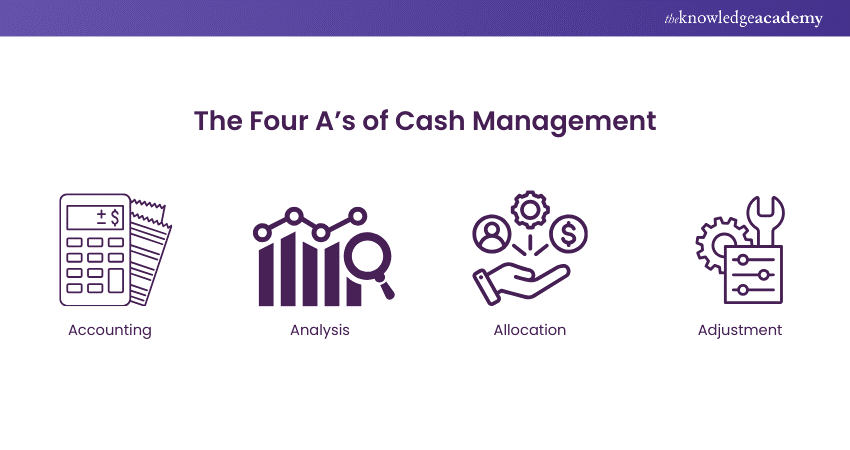We may not have the course you’re looking for. If you enquire or give us a call on 01344203999 and speak to our training experts, we may still be able to help with your training requirements.
Training Outcomes Within Your Budget!
We ensure quality, budget-alignment, and timely delivery by our expert instructors.

In the rapidly moving business environment, efficient Cash Management is not simply tracking money, but also preserving the financial stability that drives expansion. Whether you are operating a small company or overseeing a major corporation, cash flow can determine the outcome of your prosperity.
Picture a smooth operating system (OS) like a well-functioning machine, with each part working in perfect unison. Cash Management plays a crucial role in allowing businesses to balance current liquidity needs with future investment plans.
Cash Management is not only a financial duty, but also a strategic skill. Acquiring this skill guarantees that companies can fulfill their responsibilities, capitalise on chances, and withstand economic challenges. Having a grasp on the movement of money into and out of your business empowers you to make educated choices and lower potential hazards.
Table of Contents
1) What is Cash Management?
2) Importance of Cash Management
3) How Does Cash Management Work?
4) Types of Cash Management?
5) The Four A's of Cash Management
6) What Are the Functions of Cash Management?
7) Strategies for Effective Cash Management
8) Benefits of Cash Management
9) Conclusion
What is Cash Management?
Cash Management encompasses the collection, administration, and investment of a company’s cash assets. It includes several activities, such as managing bank accounts, ensuring adequate liquidity to meet short-term obligations, optimising cash flows, and making strategic investment decisions.
Effective Cash Management enables a business to meet its financial commitments, avoid excessive debt, and strategically utilise its cash resources for growth and stability. This includes practices like forecasting cash flow, managing receivables and payables, and employing tools and strategies to optimise the handling of cash inflows and outflows.
Importance of Cash Management
The following are the importance of Cash Management:
a) Ensures Business Continuity: Adequate cash is essential for smooth operations, covering daily expenses like supplies and salaries. Effective Cash Management prevents operational disruptions by maintaining sufficient liquidity.
b) Improves Investment Opportunities: Efficient Cash Management often results in surplus cash, which can be invested in short-term or long-term opportunities, generating additional income and fostering business growth.
c) Enhances Creditworthiness: Demonstrating effective Cash Management reduces perceived risk for lenders and investors, leading to better loan terms and increased investment interest, which is advantageous for raising capital.
d) Reduces Borrowing Costs: By optimising cash use, businesses can minimise borrowing needs. When borrowing is necessary, good Cash Management helps secure favorable terms, reducing interest and fees, and improving financial health.
How Does Cash Management Work?
Cash Management is the daily monitoring of cash inflows and outflows. The following are the points of how Cash Management Works:
a) Cash Management involves the regular tracking of money coming in and going out.
b) Cash is an important resource, and managing cash and cash equivalents well can significantly improve liquidity and financial stability.
c) Corporate Cash Management is the practice of overseeing cash assets for companies.
d) Key professionals such as CFOs, finance analysts, and business managers are involved in the process.
e) These experts examine and monitor different metrics to guarantee a solid Cash Management plan and uphold financial steadiness.
Count every pound with strategies with our Cash Flow Training Join today!
Types of Cash Management?
Mainly there are four main types of Cash Management activities, and these four are mentioned below:

1) Free Cash Flow to Equity
Free Cash Flow to Equity (FCFE) is the amount of cash remaining for shareholders once all expenses, reinvestments, and debt repayments have been taken into consideration. It is an important measure for investors that indicates the amount of money a company can distribute to its shareholders.
2) Net Cash Change
Net Cash Change shows the overall cash flow throughout the financial year or from one financial year to another.
3) Cash Flow from Operating Activities
This type of Cash Management focuses on the cash flow statement, which details cash transactions from the business’s daily operations. The cash flow for investment activities is not included in this.
4) Free Cash Flow to the Company
Free cash flow indicates the cash generated from a company’s operations after accounting for depreciation, expenses, and taxes. It is primarily used for financial valuation and assessing the company’s profitability.
The Four A's of Cash Management
The four A’s of Cash Management are Accounting, Analysis, Allocation, and Adjustment. These four A’s are the structured framework for effective Cash Management:

1) Accounting
a) Strong financial record-keeping is crucial for effective cash control.
b) It involves closely monitoring all cash inflows and outflows.
c) Detailed records of financial transactions must be maintained.
d) Ensuring the accuracy and timeliness of financial data is essential.
e) The cash flow statement is a primary accounting tool for summarising total cash inflows, outflows, and cash equivalents.
2) Analysis
a) After accurate accounting of financial data, the next step is analysis.
b) Analysis provides businesses with critical insights into managing cash flow.
c) It helps identify patterns, trends, and potential areas for improvement.
d) Through analysis, businesses can recognise periods of positive or negative cash flow.
e) This process supports informed decision-making for better financial management.
3) Allocation
a) Cash Allocation involves determining how funds are distributed across various financial goals.
b) These goals may include operational costs, debt servicing, investments, and other financial objectives.
c) Efficient cash allocation ensures optimal use of resources and prevents unproductive cash from remaining idle in the company.
4) Adjustment
a) Cash Management requires ongoing adjustments by business managers as situations change.
b) Adjustments are made in response to evolving cash flows, market conditions, and unexpected events.
c) Regularly assessing and modifying the Cash Management strategy is crucial to maintaining its efficiency.
What Are the Functions of Cash Management?
a) Inventory Management: Effective inventory management helps clear blocked sales, reduce excess stock, and improve liquidity. By managing funds efficiently, companies can sell existing inventory, ensuring a steady cash inflow.
b) Receivables Management: After a credit sale, a company records the sale, but payment is often pending. Cash Management ensures timely collection of receivables, maintaining adequate liquid cash.
c) Payables Management: Payables are liabilities incurred when purchasing on credit. Effective fund management ensures timely repayment of loans and credit purchases, avoiding penalties and interest charges.
d) Short-term Investment: Cash Management aims to prevent cash shortages and insolvency. Surplus cash can be invested in short-term instruments like government securities to enhance value.
Turn cash cycles into powerful business assets with our Cash Cycle Management Training. Sign up now!
Strategies for Effective Cash Management
The following guidelines aid in efficiently handling cash:
a) Consistently forecast upcoming cash flows to prepare for potential excesses or deficiencies. This includes evaluating historical patterns and contemplating potential future situations.
b) Establish budgets for different business activities and track spending compared to these budgets to manage costs.
c) Utilise tactics to ensure prompt payment collection, like providing discounts for early payments or utilising effective invoicing platforms.
d) Plan payment to suppliers or creditors strategically in order to capitalise on credit terms and avoid late fees.
e) Maintain enough cash reserves to cover immediate expenses, while being cautious not to put too much money into assets that are not easily sold.
f) Consistently monitor and reduce unnecessary costs to ensure a strong cash flow.
g) Create a backup fund for unforeseen costs or uncertainties, offering a financial safety net.
Benefits of Cash Management
The following pointers include the benefits of Cash Management:
1) Optimised Cash Utilisation
Optimised cash utilisation in Cash Management involves effectively allocating and managing available cash resources in a strategic manner. Business managers need to strike a balance between keeping enough cash on hand and investing excess funds in a way that aligns with their goals and risk tolerance.
2) Decreased Borrowing Costs
Lowering interest expenses, improving financial health, and preserving credit ratings can be achieved by effectively managing cash to reduce borrowing costs. It also gives companies greater flexibility, control, and profitability. This happens because it releases funds for investments, preventing the need for debt servicing and reducing financial risk.
3) Enhanced Decision-making
Making decisions based on information in Cash Management has benefits such as efficient distribution of cash flow, successful management of liquidity, prevention of risks, and strategic investment decisions. This results in saving money by pinpointing inefficiencies and promoting business expansion with important investment chances.
4) Liquidity Management
This involves actively making sure that a company has sufficient cash available to fulfill immediate financial responsibilities. These consist of categories like payroll, rent, and debt repayments, along with responsibilities like accounts payable (A/P) payments. Managing liquidity prevents possible financial emergencies and preserves cash reserves. This guarantees that businesses can function without any disruptions.
5) Risk Mitigation
Broader implementation of strong Cash Management practices can assist businesses in predicting possible cash deficits and proactively addressing them. This also decreases the likelihood of market downturns, late payments, or unexpected costs.
Conclusion
In conclusion, Cash Management is crucial for any business’s financial strategy. It ensures liquidity, enhances decision-making, and optimises financial resources. By understanding cash flow types, the Four A’s Accounting, Analysis, Allocation, and Adjustment the businesses can improve Cash Management practices and drive long-term success. Effective Cash Management is essential for financial stability and strategic growth.
Predict, prepare, and prosper with our expert Cash Flow Training Register now!
Frequently Asked Questions

Cash Management aims to ensure a business has sufficient cash to meet obligations. It involves optimising liquid assets, investing wisely, and minimising operational and overhead costs for better financial efficiency.

Indeed, the management of cash is an important talent that requires the efficient monitoring of a corporation's cash flow. It guarantees that the company can fulfill financial responsibilities, make smart investments, and uphold financial stability with minimal risks. Crucial for financial managers, it promotes both stability and growth.

The Knowledge Academy takes global learning to new heights, offering over 30,000 online courses across 490+ locations in 220 countries. This expansive reach ensures accessibility and convenience for learners worldwide.
Alongside our diverse Online Course Catalogue, encompassing 19 major categories, we go the extra mile by providing a plethora of free educational Online Resources like News updates, Blogs, videos, webinars, and interview questions. Tailoring learning experiences further, professionals can maximise value with customisable Course Bundles of TKA.

The Knowledge Academy’s Knowledge Pass, a prepaid voucher, adds another layer of flexibility, allowing course bookings over a 12-month period. Join us on a journey where education knows no bounds.

The Knowledge Academy offers various Accounting Courses, including the Cash Flow Training, and the Inventory Accounting and Costing Course. These courses cater to different skill levels, providing comprehensive insights into Cash Flow Analysis.
Our Accounting and Finance Blogs cover a range of topics related to Cash Budget, offering valuable resources, best practices, and industry insights. Whether you are a beginner or looking to advance your Accounts Management skills, The Knowledge Academy's diverse courses and informative blogs have got you covered.
Upcoming Accounting and Finance Resources Batches & Dates
Date
 Financial Modelling and Forecasting Training
Financial Modelling and Forecasting Training
Fri 28th Feb 2025
Fri 4th Apr 2025
Fri 27th Jun 2025
Fri 29th Aug 2025
Fri 24th Oct 2025
Fri 5th Dec 2025







 Top Rated Course
Top Rated Course



 If you wish to make any changes to your course, please
If you wish to make any changes to your course, please


